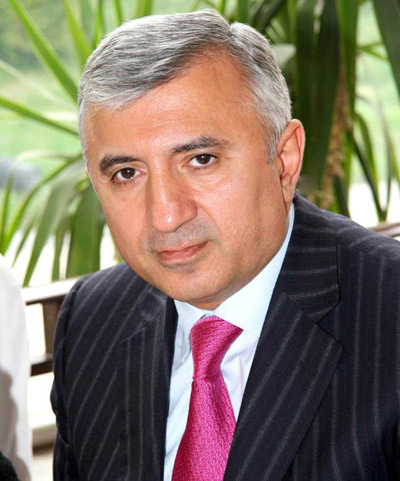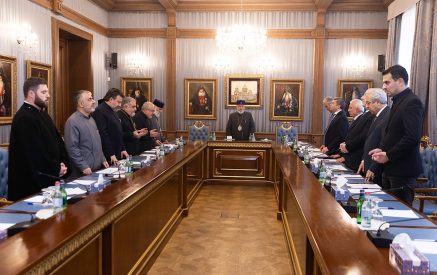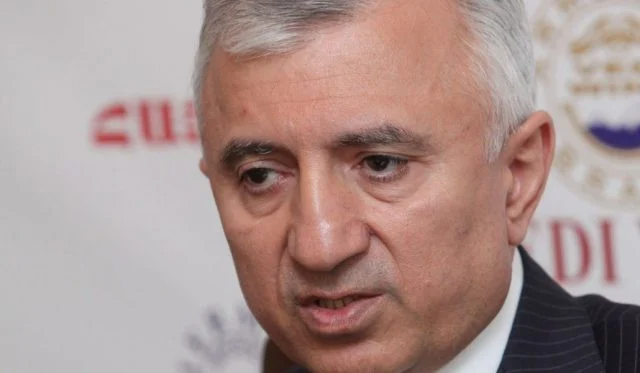We talked to the Advisor to the Constitutional Court of Armenia, the Chairman of the Board of the “Center for Constitutional Rights”, Doctor of Law Sciences, Professor Gevorg Danielyan regarding the second conference of all Armenian lawyers entitled the “Ahead of the 100th Anniversary of the Armenian Genocide” held on July 5.
– Mr. Danielian, the Attorney General Aghvan Hovsepyan took part in the conference, and the prosecutor expressed the following thought in his speech: “The Republic of Armenia should get its lost territories.” Many politicians have been talking about this, but it is the first time that the head of the country’s power structure is making such a claim publicly. Can it be perceived as the official viewpoint of Yerevan? What impact will Prosecutor demanding speech make, if we take into account the fact that often the issue of Armenian genocide recognition or non-recognition is considered as a tool to exert political pressure on Turkey.
– The main topic of the second conference of all Armenian lawyers is related to the legal aspects of the Armenian Genocide. Naturally, the issues of regional legitimate requirements were also discussed. However, the scope of discussed questions was not limited only to the issues of compensation or restoration of territorial integrity, moreover, compensation was not considered to be only in terms of material responsibility. ultimately, at present the institution of moral responsibility has obtained a key importance, as well. Moreover, an opinion is quite legitimately voiced, according to which denial of Armenian Genocide by Turkish authorities is another manifestation of moral damages. The conference is a platform to express viewpoints, by the way, during the last session I noticed that, with respect to the legal basis for the same territorial claims, the disagreements were almost getting the nature of intolerance, therefore I explained that the debate can only be successful as a result of respecting the opinions of others and summarizing diverse viewpoints under development of unified positions. I cannot be the right person to comment on aforesaid specific viewpoint, moreover its state and legal aspects (if, indeed, there is such).
– Mr. Danielyan, there often happen events devoted to the Armenian Genocide, how will you single out this one, and what did it give to us, and what can we expect from it?
Read also
– Without reservation, I can say that the conference was a success, it did not become an environment of publicizing merely popular viewpoints and facts. Personally, I welcome the initiative of the Ministry of Diaspora and the Pan-Armenian Forum of Lawyers, as it was initially refrained from undue solemnity characteristic to the events that each year coincide with the agenda of events of the Armenian Genocide on April 24. I emphasize, undue solemnity, because during the conference it is appropriate to have in depth knowledge to discuss the issues, and the ability of ignore just situational sub-items and so on. One of the ideas of the conference was also the fact that all Diaspora Armenian lawyers tried to doubtlessly emphasize that the questions with regard to legal issues to overcoming the consequences of the Armenian Genocide are actual, and they will remain in the focus of their attention not from time to time, but always and systematic. Regarding your next question, I would like to note that a committee is formed with the initiative of the President of Pan-Armenian Conference of Lawyers, President of the Constitutional Court Gagik Harutyunyan, which should properly conduct a complex historical-legal and political researches within the shortest term, and submit the Board of the Committee a package of legal aspects aimed at solution of aforesaid problems.
– What was the necessity of forming such a committee? Don’t you have the answers to those questions? Are we just going to examine now and make sure in the occurrence of the Armenian Genocide?
– The situation is different, no one can argue that the research should be done just now and the solutions suggested. First, the conference clearly underlined that it is necessary to properly evaluate the work already done. At the same time, it was considered necessary to clarify the scope of questions of practical significance and submit necessary legal methods to solve them. In fact, the review of individual historians was considered unacceptable, perhaps in a metaphorical sense that the rich set of researches should be forwarded from historians to lawyers. I first noticed that some research has been done by the lawyers and have already somehow predetermined the nature of the works. I especially referred to the former head of Constitutional and International Law Department of the Faculty of Law of YSU, Doctor of Law Sciences, Professor Aghasy Yessayan, who still in the 60’s of the last century had left a rich legacy in the legal aspects of the Armenian Genocide.
The world-renowned lawyers are includes in the new committee, in particular, the Director of Management Affaires of the Armenian National Committee of America Kate Nakhapetian, expert in international law Suren Seraydarian from Austria, Professor in international law Roberto Malkhasian from Argentina, lawyer Rodney Dakessian from Lebanon, lawyer Rita Avedissian from Iran and others. From Armenian lawyers, the well-known specialist in international law, member of the Constitutional Court Dr. Vladimir Hovhannisyan, Head of Legal and Advisory Service of the Constitutional Court, again an expert in international law Vladimir Malkhasyan, President of “Modus Vivendi” Center Ara Papian and others were included. By the decision of the Conference I was elected as a Coordinator of the Committee, which I consider a very responsible and honorable for me.
We intend to proceed immediately to clear and particular steps. In fact, many people expressed their willingness to cooperate, but we will not consider this as a “PR campaign”, so it will be clear to everyone that a serious and complex scientific work is expected without expectation of gratitude: the sense of duty is going to gather us. At this point, purely for political reasons, I do not think appropriate to fully explore our programs and directions of the activities, but I will say in brief that our task is not only suggesting legal solutions by the results of comprehensive survey of legal documents operating internationally, but appearing with specific initiative to improve them.
– Do you think that the international legal acts with regard to legal regulation of the genocide do not sufficiently contain the answer to the questions raised?
– This approach, however, is a new and bold, but, I am deeply convinced that it is extremely important. In this case, it is too early to identify the scope of questions but with one particular example, perhaps, my words will become objective. Still in 1946, Raphael Lemkin, developing a draft of the Genocide Convention, assumed that the destruction of people’s culture is also a variety of genocide, because the ethnic grouping without cultural roots quickly loses its national characteristics and dissolves in other nations. However, to adequately understand this approach in those times, necessary legal culture was not formed. If similar aspects are possible to suggest to the competent international structures, it will enable to provide appropriate legal assessment and to initiate pursue, for example, with respect to mass destruction cultural values and cross-stones unleashed by Azeri.
In fact, these issues have become subject of a comprehensive study in the bilingual work of a young lawyer Lilit Grigoryan’s “Cultural genocide”. – At the moment, are there grounds for practical steps, or we have to wait for the results? – At the moment, with regard to some questions, there are grounds for initiating the trial. A private example that I touched upon in my report. In the part of Cyprus under Turkish rule, an Armenian Church was completely destroyed and robbed. The church disposes the full facts (photos, inventory records, etc.) that the authors of organizing this are specific representatives of the power, by the way, some of the stolen icons was later bought by Armenian benefactors at the auctions and handed over to the church. In my opinion, it is now the time to present the national court instances a claim on at least compensation for damage caused.
Eva HAKOBIAN


























































